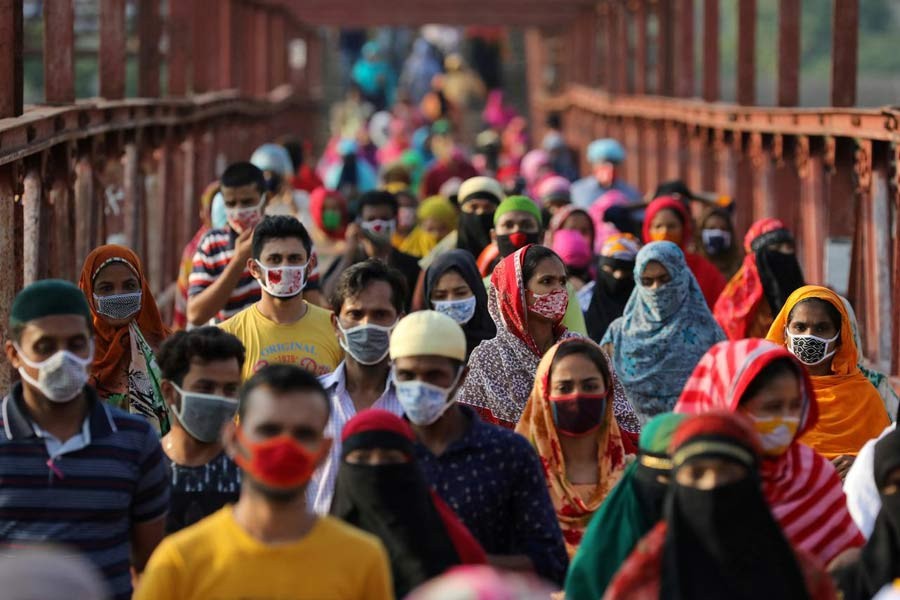
Published :
Updated :

The mantra that 'one person's spending is another person's income' may be largely null and void during the ongoing pandemic.
The money spent on medicare, for instance, may not return to those who have lost their jobs. Shops of semi- and non-essential products that remained closed or saw drastic fall in sales can't benefit from whatever flow of cash is available in the market. Thus, the economy looks somewhat like a one-way flow of rivers from the Himalayas towards the Bay of Bengal.
There is a difference, however. Vapours are developed from the sea and clouds move towards the hilly regions of South Asia for rainfalls that eventually benefit the billion-plus people. In the material world of coronavirus crisis, escalating costs of medicare services, and rising bills for buying foods and availing of utility services as against a decline in demand for most goods and services other than essential ones and income erosion, loss of working opportunities and shortage of new job openings have created a situation that is devoid of horizontal distribution of money among different groups.
People's movement on the streets, to and from workplaces and shops and markets, may give an impression that normal economic activities have resumed. The rise in per capita income to US$2,554 or average income of around Tk 18,000 for each Bangladeshi a month may further create a sense of complacency.
What we fail to comprehend is that this is not the minimum earning of each citizen! The estimation itself recognises income disparity while inequality is already widening in society as studies suggested in recent years.
The hike in fuel prices and subsequent increase in transport fares -against the backdrop of the fallout of the pandemic - may accelerate the one-way flow of money. The costs of doing business will increase for millions and the commoners will only continue to lose money for meeting basic needs of life.
Other than the fortunate ones who are somehow placed to receive the flow of cash, none would be happy about what is euphemistically called adjustment of fuel prices and that of transport fares. It's they who would have to bear the potentially higher costs of goods and services they need to consume.
This is the situation which makes sure that everyone has to spend but can't earn. There is no story in the country that the majority of the youth have found opportunities for earning a living independent of the Covid-19 effects on the economy. The International Labour Organisation has projected 5.0 million job loss for Bangladesh in 2021.
The pandemic restrictions have made one-fifth or 32.4 million Bangladesh people what the recent PPRC-BIGD survey called 'new poor'. Between March and August this year, income reportedly dropped by 18 per cent in urban slums and 15 per cent in villages.
We may see difference of opinions over the prevalence of poverty in such a huge proportion, especially in view of political implications of the term poverty over the decades.
However, the debates over number or percentage sometimes don't make much sense because day-to-day struggle of every family that is facing crisis of livelihoods is not reflected in one single report.
The people in Bangladesh are often lauded for being extremely resilient during most crises but what is ignored is that they have exhausted their resilience for overcoming challenge after challenge.
Apart from the salaries and other benefits paid with taxpayers' money to public servants and their contractors and some aid programmes, the state has no employment guarantee scheme or social security policy for all citizens so that they also could have received certain amount to survive and give back whenever they can.
Neither has there been a massive investment scheme for entrepreneurs of any strata to expedite the economic recovery and attain welfare-oriented higher growth.
A major problem in understanding the statistics-based development is that number or percentage hides the human faces. A record foreign exchange reserve doesn't show the pains millions of workers at home and abroad take to earn dollars.
Still, when the number of sufferers exceeds the level assumed to be normal to the establishment, reactions can be felt across society. If every family in Bangladesh is part of the economy, leaving a large number of such families behind makes no sense.
khawaza@gmail.ccom


 For all latest news, follow The Financial Express Google News channel.
For all latest news, follow The Financial Express Google News channel.